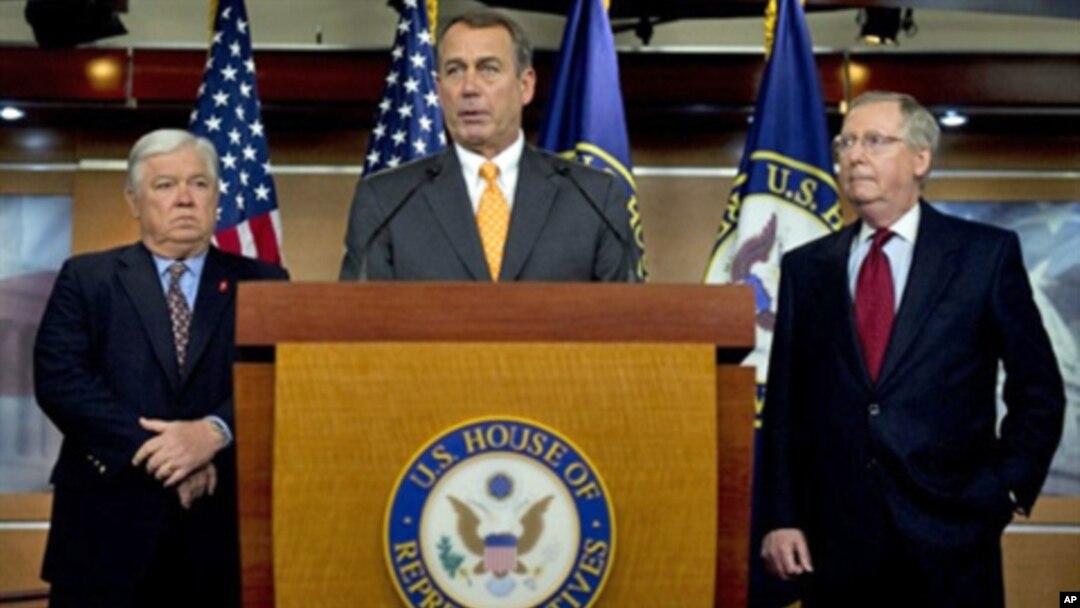The United States woke up to a new political reality Wednesday, with the opposition Republican Party taking control of the House of Representatives and extending its influence in the Senate. The results of Tuesday's midterm elections sent a clear message of frustration to Democratic President Barack Obama only halfway through his four-year term of office.
The new balance of power will impact domestic policies, but what does it mean for governments that are watching from afar? China is among several high-profile foreign policy issues for American politicians, which raises questions about how the new lineup in Congress will affect Washington's relations with Beijing.
Hong Kong-based analyst Mark O'Neil, who has covered China since 1985, says there was great public interest in China about the U.S. election, partly because the United States is the number one foreign story for the Chinese media. The United States, he adds, remains the top destination for Chinese students studying abroad.
The Chinese government cares about the direction of U.S. politics, but it does not appear to favor one party over another, says O'Neil.
"We've had the Clinton presidency, the Bush presidency, now we have the Obama presidency, and there's been a continuity in U.S. policy toward China through these different presidencies. So whilst there are differences in nuance, I think overall China doesn't have a great preference one way or the other."
During the election campaign, China became a scapegoat for both Democrats and Republicans, who blamed Beijing for stealing U.S. jobs and undervaluing its currency. O'Neil says Beijing should not be too concerned that the campaign slogans will turn into actual protectionism.
"Most Chinese believe that this was electioneering. You can't blame Americans for this terrible financial and economic mess that they're in, you have to blame someone outside. And in the past it was Japan, and now it's China. But I think now the election is over, the Congress and the president have to get down to the business of tackling issues, drawing up legislation dealing with trade issues, currency issues. You have to face China across the table, so I think all the rhetoric will calm down, and it'll be much more business-like."
O'Neil acknowledges that Republicans are generally viewed as being friendlier than Democrats towards the self-governing island of Taiwan, which China considers part of its territory. On this point, he says, Beijing has a reason to be concerned about a Republican majority in the House of Representatives.
"I think Congress will be much more favorable to Taiwan, more willing to sell more advanced weapons and that will make China very angry. Because China's position is that the U.S. should not export any weapons at all. China is sort of limited in its retaliation because it is still so heavily dependent on the U.S. market for its exports and its dependence on the U.S. treasuries that it holds. So China does not have a very strong hand, but it could take more minor steps on the issue."
Unlike O'Neil, VOA Senior News Analyst Gary Thomas says because China was a scapegoat for American economic problems in some election races, new lawmakers may favor more protectionist U.S. trade policies.
"An economic issue that did figure in with a foreign policy angle was especially when the Tea Party candidates were accusing the Democrats of outsourcing jobs overseas or encouraging outsourcing jobs overseas. You may see some protectionist measures there in terms of trying to protect American jobs."
Thomas does not expect the power shift in Congress to have any effect on other top U.S. foreign policy issues.
"Foreign policy is vested in the Executive [the presidency] although Congress does have the power of the purse [allocates money]. The second thing that was notable in this election, there was no mention of foreign policy. It was all about the economy, it was about debt. It was all about the deficit. No mention of the war in Afghanistan. No mention of Iraq."
Despite the focus on U.S. domestic issues, the world was closely watching the American election.
In Pakistan, for example, observers were looking for clues to what the political shift might mean for the war in Afghanistan and the billions of dollars in U.S. aid earmarked for the Pakistani government. VOA's correspondent in Islamabad, Meredith Buel, describes reaction in a country which has been a crucial, but reluctant, U.S.-ally in the war against terrorism.
"There's been really no official concern expressed here about the possibility of significant Republican gains in the U.S. Congress. Now, that being said, Republicans have run on a platform of less spending and shrinking the size of the United States government. Pakistan is one of the major beneficiaries of U.S. foreign aid... and a recently announced $2 billion military assistance package. Now, no anxiety is being expressed here about that aid to Pakistan being in jeopardy, but that could be an issue with a Republican-controlled House of Representatives."


